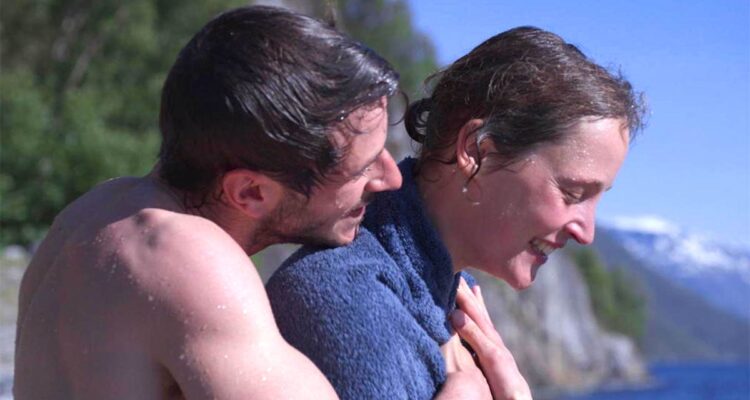Inspired by her own late mother’s long battle with multiple sclerosis, writer/director Emily Atef’s (“Molly’s Way,” “3 Days in Quiberon”) latest work, “More Than Ever,” delivers a poignant and well-acted story. Featuring Gaspard Ulliel’s last performance, the film asks its audience to face the reality of and ponder the inevitability of death as well as the line between those who have experienced a type of suffering and those who haven’t.
READ MORE: Cannes Film Festival 2022 Preview: 25 Must-See Films To Watch
In her first of two films premiering at this year’s Un Certain Regard section at Cannes — the second being Marie Kreutzer’s brilliant “Corsage” — Vicky Krieps stars as Hélène, a 33-year-old woman struggling with idiopathic pulmonary fibrosis, a rare illness that impacts the lungs and causes breathing to become increasingly more difficult until the person eventually suffocates to death. When she becomes eligible to receive a lung transplant with a 50% success rate, she isn’t immediately on board with taking the risk and seems accepting of the fact that there is no other type of medical intervention and will thus die, much to the annoyance of her supportive husband Mathieu (Ulliel), who insists that she must continue to fight her illness in order to stay alive.
While looking up “what to do when you are dying” one night, Hélène comes across the blog of a Norwegian man who posts photos related to his cancer under the name “Mister” that stands out to her amongst the sea of cheesy and ingenuine inspirational quotes that cloud the Google search results. Soon after, Hélène strikes up a friendship with Mister, who she shares something in common with and is able to connect to in a way that isn’t possible with Mathieu and her other healthy loved ones. Fascinated by Mister and the quaint countryside location where he resides, Hélène decides to leave her entire life behind and escape to Norway and stay with Mister, whose real name is Bent (Bjørn Floberg). Once the film enters its Scandinavian half, Atef and co-writer Lars Hubrich make up for any minor faults that occur in the first half, taking advantage of Norway’s beautiful nature and using it as the backdrop for Hélène’s personal journey.
What sets “More Than Ever” apart from many films centered on people with terminal illnesses is that Hélène refuses to be defined by her illness, never letting it hinder her ability to live her daily life even if it causes her to end up relying on a respirator at the end of the stay, frequently testing limits by going on long walks and working up the courage to attend a dinner party where her friends tiptoe around her feelings. Although Mathieu maintains a positive outlook on her condition and believes that her unconventional decision to not go through with the transplant means that she is choosing to give up, Hélène knows what is right for herself and views the choice as a way of being able to take control of her own fate and not leave it in the hands of others.
The late Ulliel, who tragically passed away in January 2022, is heartbreaking and restrained in his final on-screen role as Hélène’s stressed but continuously encouraging partner, and watching him perform given his recent death is difficult but adds an additional emotional layer to both his excellent performance and the film’s genuine exploration of death. Krieps — undoubtedly this year’s queen of Cannes — is at the top of her game here, imbuing the selfish Hélène with humanity and a complexity that resonates as she makes decisions that aren’t considered the norm but gives the audience a chance to understand why she is choosing this life path. The chemistry between the pair, who spend most of the first half together in their cozy Bordeaux apartment, is palpable, with Atef placing an emphasis on the many silences that occur between the couple, building their authentic intimacy and relationship dynamic. Bent, on the other hand, is thrown into the mix for the sole purpose of driving Hélène’s narrative forward while unfortunately remaining a one-note character who never gets the opportunity to receive more development. Regardless, Floberg gives a memorable turn as the film’s much-needed comic relief.
While “More Than Ever” spends much of its time concerned with Hélène’s way of dealing with her illness, the film is a love story at heart. Despite wanting Hélène to make the decision that could keep her alive, Mathieu’s love for her overrules any reasoning he comes up. He becomes supportive of her choices, like leaving everything behind for a relocation to Norway, and he ultimately joins her briefly in a third act that packs an emotional punch. For Hélène, being in Norway means being freed from any responsibilities awaiting her at home, with the lush landscapes filled with snow-capped mountains, vast spaces, and various bodies of water perfect for a quick swim, serving as a symbol of the impossibility of avoiding death while the natural world remains forever. [A]
Follow along with all our coverage from the 2022 Cannes Film Festival.

